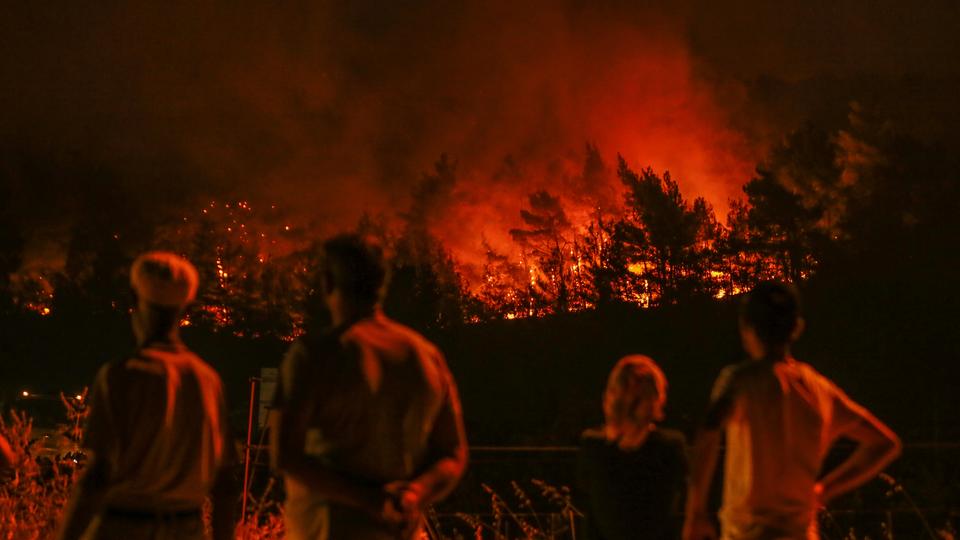The COP26 meeting at Glasgow between October 31 and November 12 will test the world’s willingness to work together to save the planet and avoid catastrophic effects of climate change. However, amid the debates over the equity in sacrifices needed to curb the rise in global temperatures, various countries in West Asia and North Africa region are already facing its ill effects. Most of the governments in the region find themselves unable to take measures to tackle the issue due to existing conflicts and endemic external interventions.
West Asian and North African countries are diverse both in terms of economic development and their levels of emissions. The wealthy gulf countries like the UAE, Kuwait, Qatar, and others have high per capita emissions but due to their small size do not contribute a significant number overall. The top three emitters from the region are also three of the largest countries in the region, Iran, Saudi Arabia and Turkey. These are the only ones in the top 20 emitters which contribute around 80% of all global emissions in the world today.
When it comes to the effects, however, the majority of the poorer countries in the region are facing a set of climate related problems with growing concerns about the region’s inhabitability. Several studies have indicated links between the natural calamities and conflicts and wars in the region. They point out that climate change has destroyed existing sources of sustenance, making states weak and limiting the futures and possibilities for people in these countries.
Climate catastrophes in the region
The United Nations expects all the countries to follow their commitments made in the Paris Agreement in 2016 and start cutting the emission of greenhouse gases now to achieve Net Zero by 2050. It warns of catastrophic effects in the case of the failure and 2.7 degree celsius rise in global temperature by the end of the present century. However, many countries in the region are already facing unprecedented natural disasters.
Only this year, countries such as Turkey, Syria, Lebanon and Algeria faced massive wildfires which destroyed hundreds of hectares of forests and farms and burned villages. Scores of people were killed in the blazes. Subsequently, Turkey also faced massive devastating floods.
Gulf countries including Iran and Iraq are now recording 50 degrees and above day temperatures during the summer. Kuwait recorded a new high in day temperatures during summer this year with 53 degree celsius. According to some studies the region of the Middle East is warming almost twice faster than the global average and it is expected to be four degrees warmer by the end of 2050 as against the global worst case scenario of 2.7 degree celsius by the end of the century.
Countries such as Iran, Iraq, Syria and Yemen have been experiencing drought for many years now. The hunger caused by the deficient rains adds into the distress of rural populations in most of these countries already suffering due to the wars.
Drinking water is also becoming scarce with nine of the ten most water-scarce countries in the world being located in the region. This is giving birth to new conflicts in countries such as Iran, where the Arab-dominated Khuzestan province saw protests over the lack of drinking water which caused the death of at least 6 people in July this year. Similar scenes have become common in Afghanistan, Iraq, Syria and Yemen.
The rise in temperatures and lack of rain has made natural bodies of water, already rare in most parts, shrink and for agriculture to be expensive or even impossible. For example, this year Turkey’s second largest lake, Tuz, dried up completely. In recent times, many countries have seen a rise in desertification, more frequent sandstorms, and expansion of existing deserts.
At the same time, some Gulf countries have also experienced excess rains and flooding like those in Omar recently.
Regional initiatives
The UN Environment Program (UNEP) is pushing countries to adhere to their promises made in the Paris Agreement in order to limit the rise in the global temperature to 1.5 degree celsius. While in a limited way, some governments in West Asia and North Africa have started initiating some policy reforms to help achieve these goals such as greater reliance on renewable sources of energy and investing in research to develop sustainable production techniques.
Turkey finally ratified the Paris agreement on October 6 and vowed to achieve net zero by 2053. Saudi Arabia also launched a Middle East Green Initiative days before the COP26 meeting and has vowed to spend USD 10.4 billion to create an investment fund and a green energy project to create regional institutions and initiatives to deal with the climate change issues and to collectively achieve Net Zero. It has promised to achieve Net Zero by 2060.
Similar initiatives have been taken by other countries in the region such as the UAE. However, most of the other countries in the region have failed to take any decisive steps to achieve their Nationally Determined Contribution (NDCs) agreed during the Paris agreement. Most of the states in the region are going through wars (Syria, Libya, Yemen) or other forms of conflicts or turmoil (Tunisia, Lebanon, Iraq) which makes it impossible for their governments to focus on policies to deal with climate change. Countries such as Iran too are hesitant to take any decisive measures due to the fragile state of its economy following the unilateral economic sanctions imposed by the US in 2018.
The West Asian and North African region is one of the regions that contributes the least to global emissions but has disproportionately been feeling the impacts of climate change and natural disasters. The ongoing imperialist-led wars and conflicts not only accelerate environmental destruction but have made it nearly impossible for these countries to implement mitigation measures.





